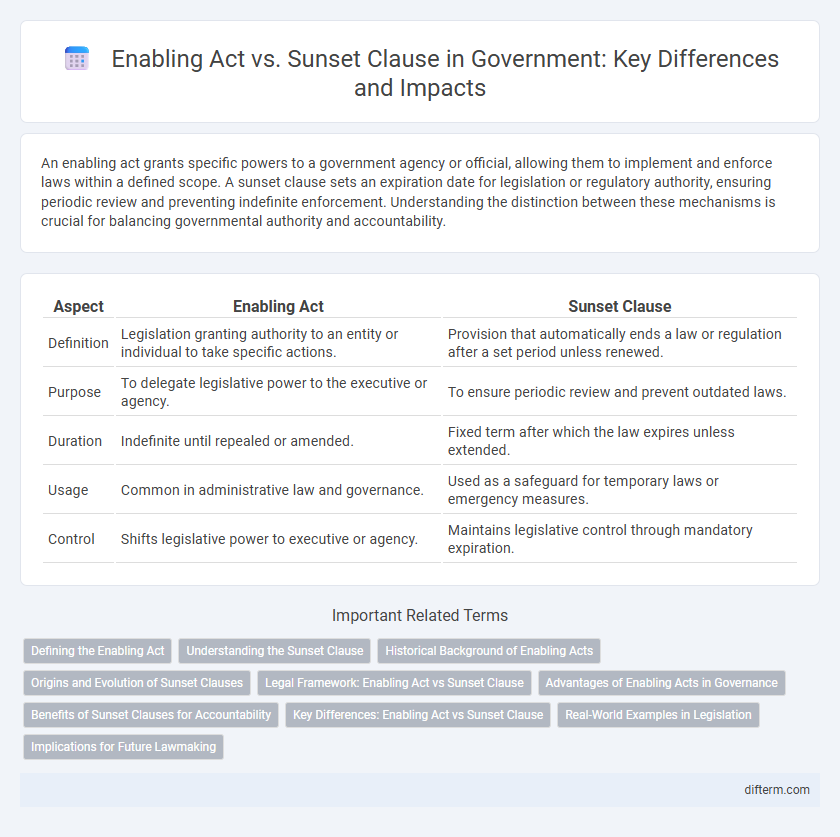An enabling act grants specific powers to a government agency or official, allowing them to implement and enforce laws within a defined scope. A sunset clause sets an expiration date for legislation or regulatory authority, ensuring periodic review and preventing indefinite enforcement. Understanding the distinction between these mechanisms is crucial for balancing governmental authority and accountability.
Table of Comparison
| Aspect | Enabling Act | Sunset Clause |
|---|---|---|
| Definition | Legislation granting authority to an entity or individual to take specific actions. | Provision that automatically ends a law or regulation after a set period unless renewed. |
| Purpose | To delegate legislative power to the executive or agency. | To ensure periodic review and prevent outdated laws. |
| Duration | Indefinite until repealed or amended. | Fixed term after which the law expires unless extended. |
| Usage | Common in administrative law and governance. | Used as a safeguard for temporary laws or emergency measures. |
| Control | Shifts legislative power to executive or agency. | Maintains legislative control through mandatory expiration. |
Defining the Enabling Act
An Enabling Act is a legislative measure granting specific powers to the government or an authority to enact laws or regulations within defined limits. It delegates authority, allowing swift decision-making and implementation without requiring further parliamentary approval for each action. The scope and duration are typically delineated within the act to ensure adherence to constitutional boundaries and prevent misuse of power.
Understanding the Sunset Clause
The sunset clause is a legislative provision that sets an automatic expiration date for a law unless further legislative action is taken to extend it, ensuring periodic review and preventing outdated regulations from remaining in effect indefinitely. Unlike an enabling act, which grants authority to a government body or official to implement specific powers or regulations, a sunset clause mandates that the law's validity is temporary and subject to re-evaluation. Understanding the operational dynamics of sunset clauses is crucial for lawmakers to maintain regulatory relevance and adaptability within government frameworks.
Historical Background of Enabling Acts
Enabling Acts historically empowered governments to enact laws or take actions without prior legislative approval, often during emergencies or periods of political transition, exemplified by the German Enabling Act of 1933 that granted Adolf Hitler dictatorial powers. These acts facilitated swift governmental responses but raised concerns about the concentration of authority and erosion of checks and balances. In contrast, sunset clauses are legislative provisions that automatically terminate laws or powers after a specified period, serving as a safeguard against indefinite extensions granted by enabling acts.
Origins and Evolution of Sunset Clauses
Sunset clauses originated in the early 20th century as a legislative mechanism to ensure temporary laws or regulations automatically expire unless renewed by the government, promoting accountability and periodic review. The enabling act empowers an authority, often the executive branch, to enact regulations within a specified scope, while sunset clauses impose a predetermined expiration date on the authority granted, limiting its duration. Over time, sunset clauses have evolved to become a critical tool in legislative governance, preventing indefinite extensions of temporary powers and encouraging transparency and legislative oversight.
Legal Framework: Enabling Act vs Sunset Clause
The Legal Framework differentiates an Enabling Act as legislation granting executive agencies authority to implement laws, while a Sunset Clause sets an expiration date for laws, ensuring automatic repeal unless renewed. An Enabling Act facilitates detailed rulemaking within the scope defined by the legislature, promoting administrative flexibility and efficiency. In contrast, Sunset Clauses enhance legislative control and accountability by mandating periodic review and preventing indefinite continuation of statutes.
Advantages of Enabling Acts in Governance
Enabling Acts grant governments the authority to implement laws swiftly, allowing for rapid response during emergencies or legislative gridlocks. These acts streamline decision-making by delegating power to executive branches, facilitating efficient governance without prolonged parliamentary debates. The flexibility provided by Enabling Acts supports adaptive policy implementation, crucial for dynamic political and social environments.
Benefits of Sunset Clauses for Accountability
Sunset clauses enhance governmental accountability by mandating periodic review and reevaluation of laws, ensuring that statutes remain relevant and effective over time. Unlike enabling acts, which grant ongoing powers without automatic expiration, sunset clauses prevent the indefinite extension of authority, reducing the risk of unchecked governmental power. This mechanism fosters transparency and compels lawmakers to justify the continuation or amendment of policies based on current data and societal needs.
Key Differences: Enabling Act vs Sunset Clause
An Enabling Act empowers the government or a specific authority to enact laws or regulations without needing further legislative approval, often for a defined purpose or period. In contrast, a Sunset Clause automatically terminates a law or regulation after a set timeframe unless renewed or extended by the legislature. The key difference lies in the Enabling Act granting legislative power, while the Sunset Clause restricts the duration of legal authority.
Real-World Examples in Legislation
The Enabling Act of 1933 in Germany granted Adolf Hitler's cabinet legislative powers, effectively bypassing the Reichstag and consolidating dictatorial control, illustrating how enabling acts can expand executive authority significantly. In contrast, the U.S. Clean Air Act includes sunset clauses that require periodic congressional review and renewal to ensure the legislation adapts to evolving environmental standards. These real-world cases demonstrate enabling acts facilitate rapid government action with lasting impact, while sunset clauses promote accountability and temporal limitations within legislative frameworks.
Implications for Future Lawmaking
Enabling acts grant specific powers to the government to enact detailed regulations, often streamlining future lawmaking by providing a clear legal framework that reduces ambiguity. Sunset clauses impose automatic expiration dates on legislation, compelling lawmakers to review and reassess laws periodically, which enhances legislative adaptability and accountability. The combined use of enabling acts and sunset clauses influences future lawmaking by balancing authority delegation with built-in mechanisms for legislative review and renewal.
enabling act vs sunset clause Infographic

 difterm.com
difterm.com